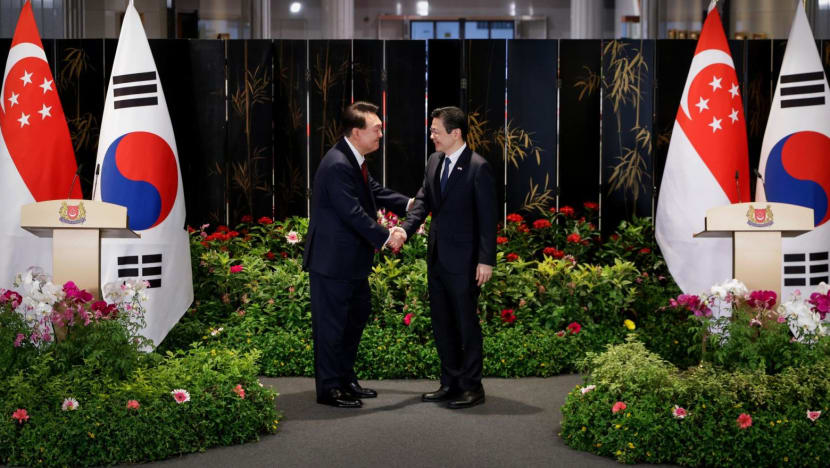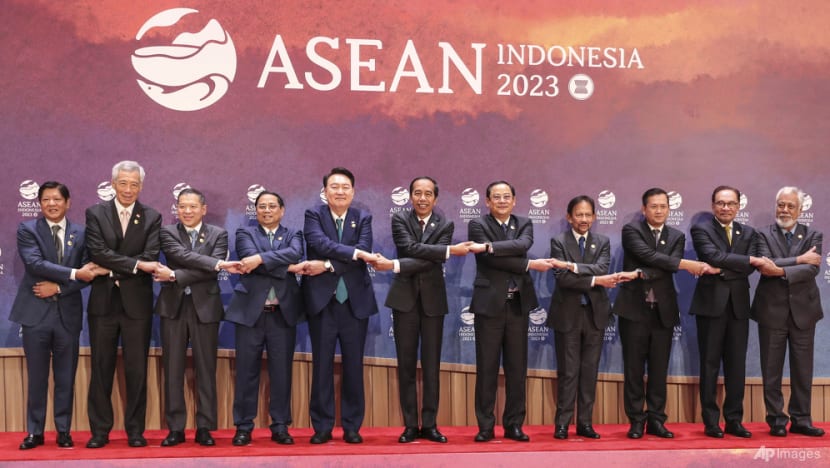Commentary: Singapore and South Korea ties go beyond K-pop and football
Ahead of the 50th anniversary of diplomatic ties between Singapore and South Korea in 2025, there is room for closer cooperation between the two countries amid great power rivalry, say RSIS’ Sarah Teo and the University of Cambridge’s Ha Chae Kyoun.

Singapore Prime Minister Lawrence Wong welcoming South Korean President Yoon Suk Yeol to Singapore on Oct 8, 2024. (Photo: MDDI/Terence Tan)

This audio is generated by an AI tool.
SINGAPORE: The state visit by South Korea’s President Yoon Suk Yeol to Singapore this week marked an important moment, as both countries celebrate 50 years of diplomatic relations next year and work towards a strategic partnership.
Bilateral ties between the two countries have rarely come under the spotlight, but public perceptions of each other seem healthy. Two in three Singaporeans have a positive perception of South Korea, driven primarily by pop culture and personalities such as English Premier League footballer Son Heung-min and K-pop band BTS.
This is according to a recent poll commissioned by the South Korea embassy in Singapore which also revealed generally low awareness of issues beyond the Korean Wave.
This corresponds to the findings of a survey released by the ISEAS–Yusof Ishak Institute earlier this year, in which only 1.1 per cent of Singapore respondents expressed confidence in South Korea to champion the global free trade agenda and a mere 0.4 per cent had confidence in South Korea to provide leadership to maintain the rules-based order and uphold international law.
In a 2021 survey conducted by the Seoul-based ASEAN-Korea Centre, South Korean youths between 19 and 34 years old picked Singapore as the most favoured and trusted ASEAN country. Singapore was also regarded as being the second closest ASEAN country, following Vietnam, to South Korea in terms of economy, society and culture, and foreign relations.
There is room to improve perceptions of Singapore-South Korea ties beyond pop culture, alongside enhancing substantive collaboration.
BEING LIKE-MINDED PARTNERS
South Korea and Singapore share a certain like-mindedness when it comes to the regional and global order, especially in promoting multilateralism and an inclusive architecture, advocating respect for international law, maintaining the global free trade system, as well as leveraging digital and technological trends.
The economic dimension is among the strongest manifestations of the bilateral relationship. Singapore was the first Asian country to establish a free trade agreement with South Korea in 2006, and both countries concluded a digital economy agreement in 2022 – the first between Asian countries.
From 2015 to 2022, Singapore was among the top two destinations for South Korean investment in Southeast Asia. As of 2022, the city-state hosts the second-highest number of South Korean businesses among the 10 ASEAN countries, behind Vietnam.
In recent times, the bilateral agenda has kept up with emerging challenges such as cybersecurity and artificial intelligence (AI). In September, South Korea and Singapore, along with the Netherlands, Kenya and the United Kingdom, co-hosted the 2nd Responsible AI in the Military Domain (REAIM) Summit in Seoul.
Interactions in academia have also deepened over the past decade. Singapore’s first endowed professorship in Korean Studies was launched at the Nanyang Technological University (NTU) in 2016 and the Korea Centre was inaugurated at the National University of Singapore’s East Asian Institute in 2021.
The Korea Foundation and the S Rajaratnam School of International Studies (RSIS) at NTU have also regularly co-organised the Korea-Singapore Forum since 2013, which brings together individuals from academia, government, businesses and media from the two countries.
These efforts to facilitate people-to-people exchanges bolster an important dimension of the overall bilateral relationship that goes beyond measurable metrics of trade and investment statistics. These are, fundamentally, about creating better awareness and promoting mutual understanding between both sides.

FRAMING A STRONG AND SUSTAINABLE PARTNERSHIP
The challenge lies in the framing of bilateral relations – which then shapes perceptions.
Historically, South Korea’s focus has been on the Korean Peninsula. While entirely understandable, this has led to perceptions that its approach towards ASEAN and its member states is driven to a large extent by its preoccupation with North Korea.
Recent administrations in Seoul, however, have started to reshape the narrative. South Korea’s Indo-Pacific Strategy document, for example, stresses the serious threat posed by North Korea’s nuclear and missile capabilities to regional and global stability.
Singapore is cognisant of the implications arising from instability on the Korean Peninsula. In 2018, it played host to the leaders of North Korea and the United States as they met in a historic summit.
Explaining Singapore’s support for the summit, Foreign Minister Vivian Balakrishnan emphasised the collective interest for a peaceful, stable and denuclearised Korean Peninsula given that “anything that happens on the Peninsula will affect the rest of the region, including Singapore”.
COOPERATION BETWEEN SMALL AND MEDIUM-SIZED COUNTRIES
Amid increasing great power rivalry, growing protectionism, and escalating conflicts across the world, small and medium-sized countries such as South Korea and Singapore benefit from closer cooperation.
It can provide better leverage against global uncertainties, build capacity to respond to shared challenges and threats, and contribute towards shoring up a regional and global order conducive to both security and socioeconomic growth.
In light of South Korea’s ambition to become a “global pivotal state” and its commitment to expand its diplomatic horizons to the wider region, Seoul should sustain this greater emphasis on its relationship with Southeast Asia as its immediate neighbour.
On Singapore’s part, it should continue to play a constructive role to accommodate Seoul’s increased engagement with ASEAN and its member states. This would be useful in supporting ASEAN’s centrality in the region as well as enhancing the grouping’s ability to address regional challenges.
The foundations for a strong and sustainable partnership between South Korea and Singapore have been nearly 50 years in the making. How both sides build on them will shape the years ahead.
Sarah Teo is an assistant professor in the Regional Security Architecture Programme, Institute of Defence and Strategic Studies (IDSS), S Rajaratnam School of International Studies (RSIS), Nanyang Technological University, Singapore. Ha Chae Kyoun is a PhD Candidate and Lee Kuan Yew NUS Scholar at Fitzwilliam College, University of Cambridge.





















